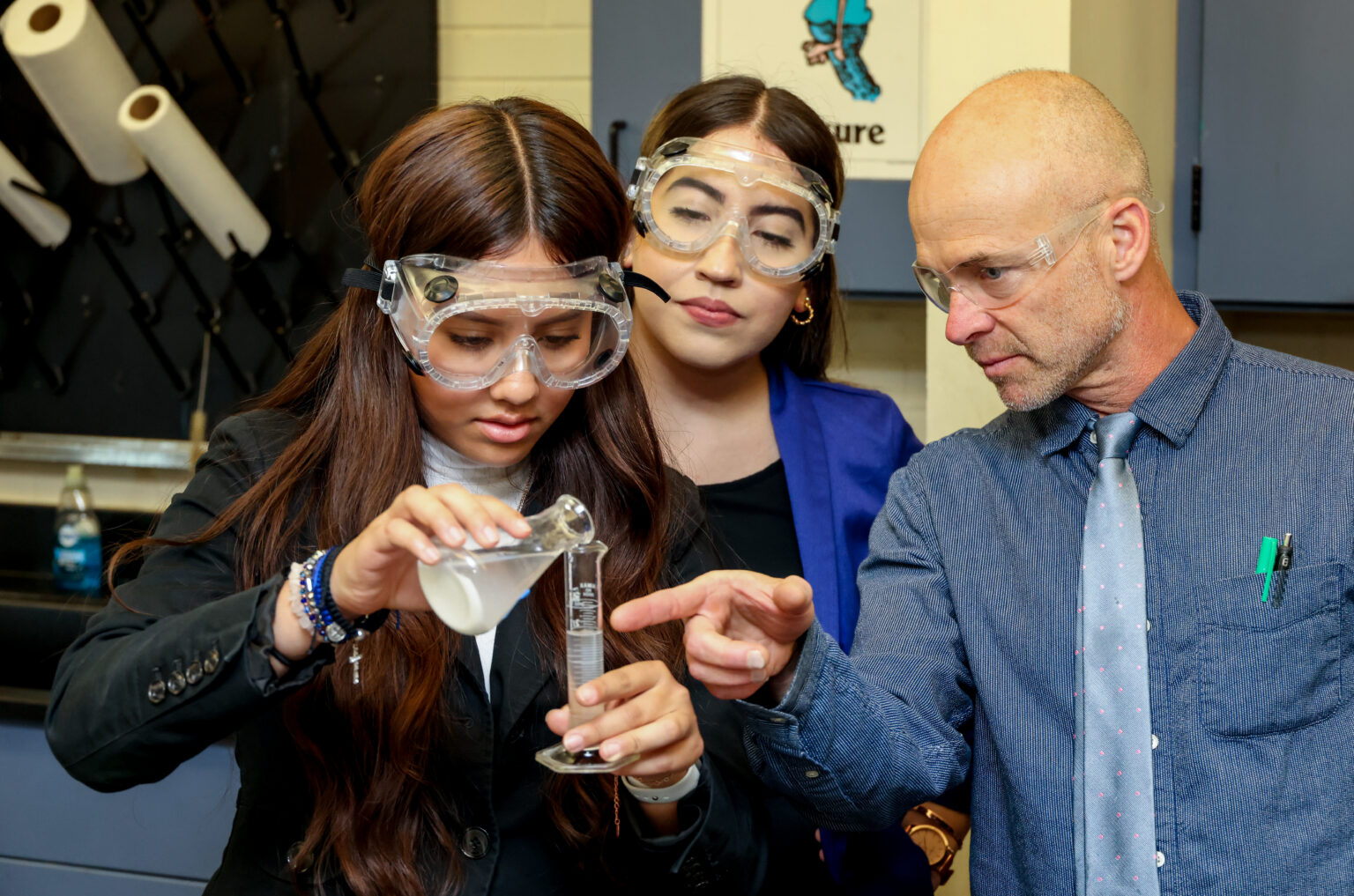Colorado Succeeds is a nonprofit, nonpartisan coalition of business leaders, working to ensure all of Colorado’s learners are educated to their greatest potential, and all of Colorado’s businesses have the talented and innovative homegrown workforce they need to thrive.
We have brought business, government, education, and community leaders across the state together to advocate for student-centered policy and programs.
Current Programs
Career Development Incentive Program (CDIP)
The Career Development Incentive Program (CDIP) provides financial incentives for school districts and charter schools that encourage high school students to complete qualified industry credential programs, internships, residencies, and AP courses. As of 2021, over 49 school districts are participating, and 4,685 incentives have been distributed.
Pathways in Technology Early College High Schools (P-TECH)
Established by the passage of HB15-1270 “Pathways in Technology Early College High Schools”, (P-TECH) is an innovative program intended to create a public-private partnership between school districts, community colleges, and one or more local high growth industry employers to prepare Colorado students for high-skill jobs of the future. As such, students graduate with both a high school diploma and an industry-recognized associate degree, in addition to gaining relevant workplace skills.
Innovative Learning Opportunities Pilot Program (ILOP)
Signed into law by SB19-216 “High School Innovative Learning Pilot”, The Innovative Learning Opportunities Pilot Program (ILOP) enables participating Local Education Providers (LEPs) to offer high school students a variety of learning experiences that usually occur outside of the classroom. These innovative learning opportunities may include work-based learning via apprenticeships and residency programs, concurrent enrollment, and competency-based learning or capstone projects. Participating districts receive full-time funding for any student who is coded as part-time if that student is engaged in meaningful, high quality experiential learning opportunities.
Path4Ward
The Path4Ward Program, established by SB21-106, allows students from low-income households who graduate early to receive funding for postsecondary education or training programs during what would have been their fourth year of high school. Postsecondary programs may be college enrollment or approved workplace learning programs like internships and apprenticeships. Participating students will receive funds depending on the semester of their graduation.
If they graduate prior to their fourth year, they will receive either 75% of the average state share of per-pupil revenue, or $3,500 (whichever is greater.) If they graduate prior to the second semester of their fourth year, they will receive either 45% of the average state share of per-pupil revenue, or $2,000 (whichever is greater.) Student funds will first be used to pay tuition, fees, or other expenses within the institution. Unspent funds may then be used by the student for other qualifying expenditures, including textbooks, equipment, or transportation.
Graduation Guidelines & Capstone Implementation:
Colorado Graduation Guidelines are a roadmap to help students and families plan for success after high school. To graduate, students choose from a Menu of Options – adopted at the local school board level – to demonstrate Postsecondary and Workforce Readiness in Reading, Writing and Communicating, and Mathematics. One of the available options is the Capstone Project, which is a district-determined, multifaceted body of work that serves as a culmination of academic and intellectual experience for students.
These projects could include a portfolio of the student’s best-researched or curriculum-based work, feature a set of experiments organized around a central problem, and showcase a community service project or learning activity.
College Credit for Prior Learning:
In 2020, HB20-1002 authorized Colorado’s “College Credit for Work Experience” framework. The law requires the Colorado Department of Higher Education to conduct a study concerning awarding academic credit for work experience within all state institutions.
The study sought to understand the processes by which a student can receive academic credit for any course in the undergraduate curriculum, free of tuition, through prior learning assessments, as well as the potential benefits to students of expanded credit for prior learning opportunities. The study also reported the potential costs incurred by institutions and the ability to recover said costs. Second, the department is developing a plan to award transferable credit for work-related experience “Work-related experience” is defined in statute as experience “that may lead to or result in a business credential, an industry credential, a technical certificate, or a professional license”. The plan is to be developed by the General Education Council and approved by the Commission in 2022.
New Programs
Employer Incentives Fund for Work-Based Learning (SB22-140, Expansion of Experiential Learning Opportunities)
SB22-140 encourages businesses to offer and hire for work-based learning programs by providing incentives for the indirect costs associated with these programs, including the training needed to successfully run a work-based learning program. The legislation acts as a work-based learning catalyst, building regular and long-lasting partnerships and investments to build long-term talent pipelines in crucial industries. The pilot program is receiving $3M through the incentive fund to support employers in expanding work-based learning for adults and youth.
Building a Student Success Dashboard for Postsecondary Education (HB22-1349 Postsecondary Student Success Data System)
HB22-1349 will create a new, robust public statewide success data system with the inclusion of key student and workforce measures so that students, industry, and the public at large can better understand employment outcomes, earnings, and job placements. The bill requires the Colorado Department of Higher Education (CDHE) to develop student success measures that measure the progression of students through postsecondary education and the impact of postsecondary pathways on a student’s career opportunities and success. It also requires the Colorado Department of Education (CDE) to include institution-specific interfaces.
Creating More Stackable Pathways Aligned to Top Jobs (SB22-192 “Opportunities for Credential Attainment)
The purpose of SB22-192 is to create more stackable credential pathways in high-need, high-demand, high-value fields at a large scale. By unbundling degree programs into shorter micro-credentials with industry value, shorter-term credentials can be “stacked” into higher-level degrees, beginning as early as high school. SB192 directs the Colorado Department of Higher Education (CDHE) to develop a process that encourages institutions to organize these stackable credentials and identify how they may become stacked into stackable credential pathways.
Authorizing a Regionally Based Innovation Fund to Address Talent (HB22-1350 “Regional Talent Development Initiative Grant Program)
The purpose of HB22-1350 is to authorize a $90M regional talent development initiative grant program within the Office of Economic Development & International Trade (OEDIT) to fund talent development initiatives across the state that meet regional labor market needs, including initiatives that meet workforce development needs in regions as they recover from the negative economic impacts of the pandemic. The bill would direct the Office of Economic Development to appoint a steering committee of business, civic, education, and nonprofit professionals to support the program administrator in developing a grant application process, establishing grant application selection and prioritization criteria, and advising the program administrator in appointing a selection committee to review grant applications and make grant award recommendations.
Creation of a K-12, Higher Education, Workforce “Blur” Taskforce (HB22-1215 “Study of Expanding Extended High School Programs)
The purpose of HB22-1215 is to create a task force focused on blurring the lines between high school, postsecondary, and workforce by designing and recommending policies to help expand early college programs and P-TECH schools and other opportunities for postsecondary credit and work-based learning in high school. The task force is required to examine how more high-quality work-based learning can be included in high school models, including industry credentials and will meet in 2022 and 2023, with final recommendations produced in 2023.

